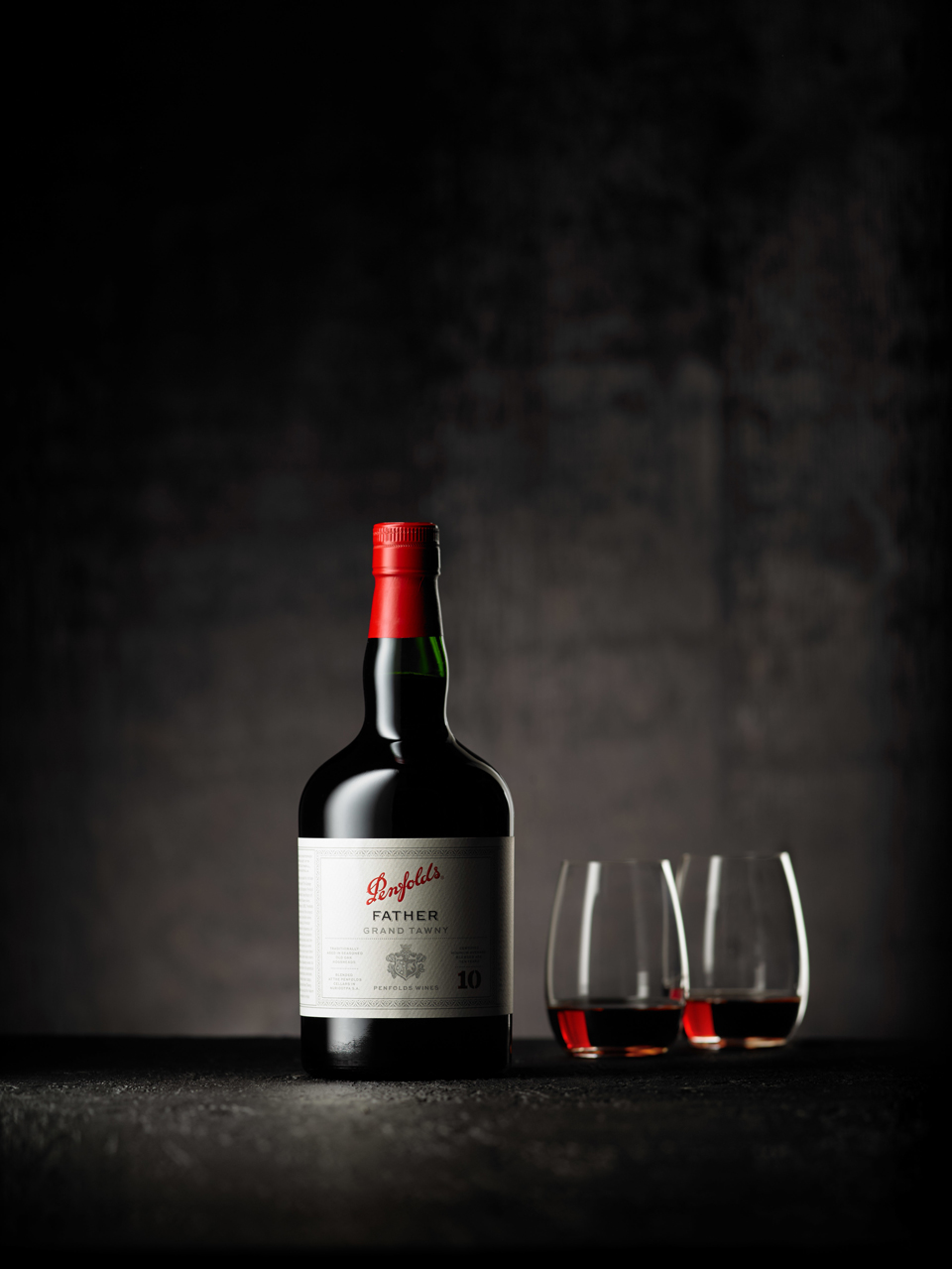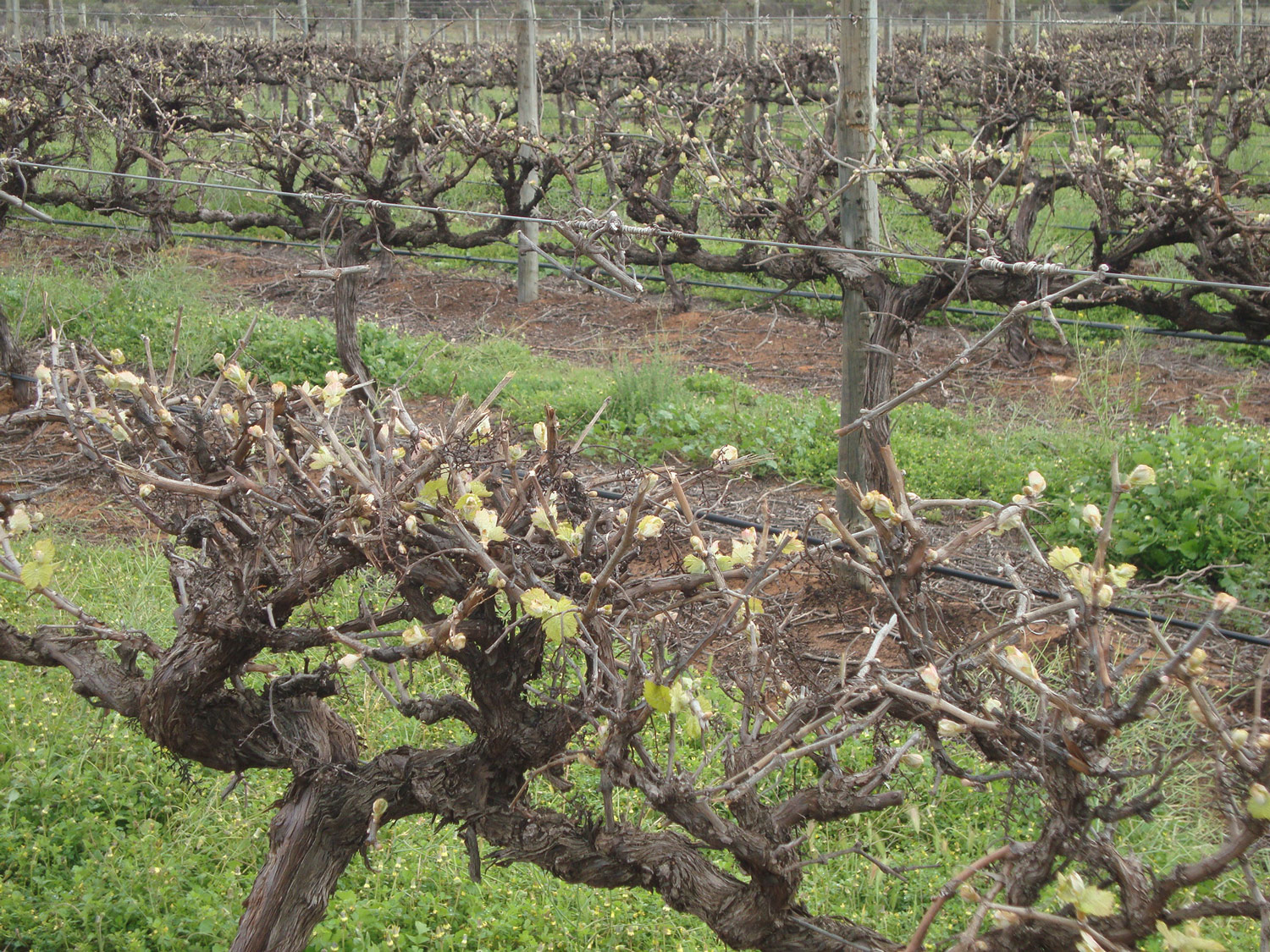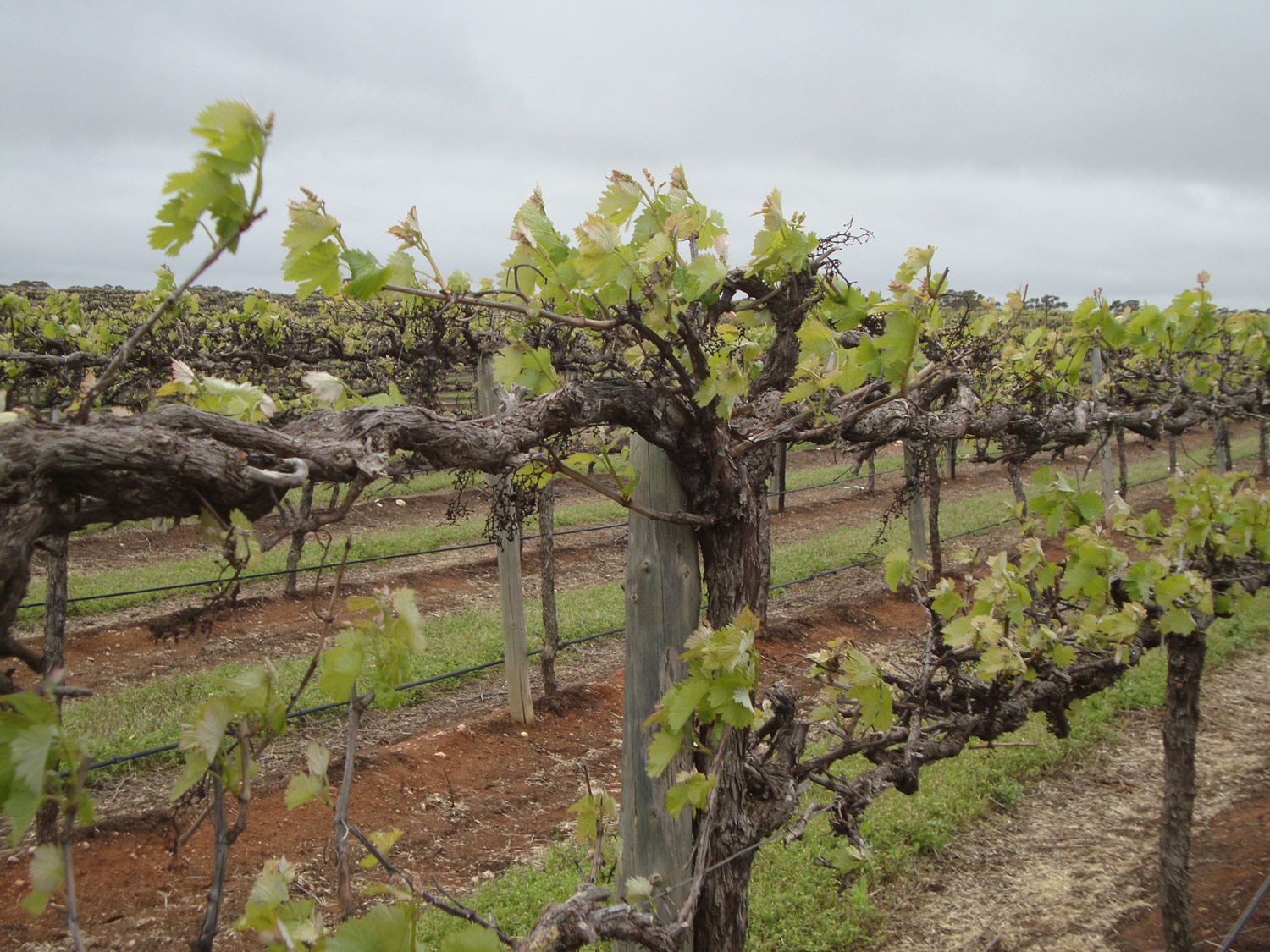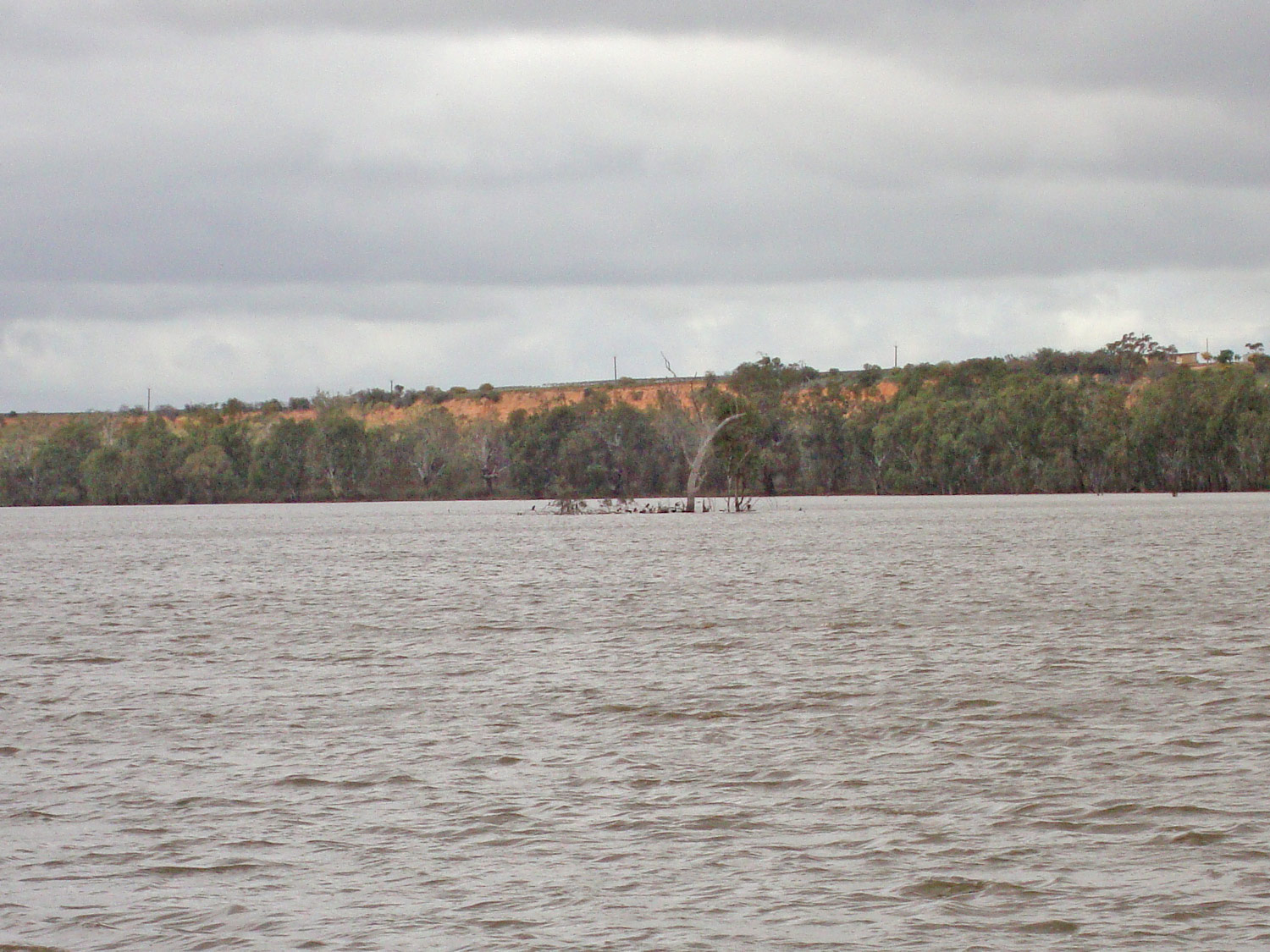The Markaranka Vineyard is at the heart of Treasury Wine Estate’s fortified wine program – making the company’s most iconic fortifieds, such as Penfolds’ ‘Father’, ‘Grandfather’ and ‘Great-Grandfather’ tawnies, as well Saltram’s ‘Mr Pickwick’. In South Australia’s Riverland, the vineyard is a large one at over 170 hectares, but it is managed by Brendan Turner with sustainability at its core, with an ongoing quest to reduce all inputs while producing super-premium fruit for flagship fortified wines.
First planted in 1982, then progressively over the years, the area under vine at the Markaranka Vineyard is just a tick under 176 hectares. The varietal mix is dominated by shiraz with 81 hectares, but there are also large plantings of chardonnay and cabernet sauvignon, with meaningful amounts of sangiovese, tinta barroca, tinta cão, touriga nacional, tempranillo, grenache, mataro and tyrian, a grape that was developed by the CSIRO. A bit more than half the vines are on own roots, while the remainder are on drought-resistant rootstock.
Brendan Turner manages the viticulture at the site, which is a key plank in the Treasury Wine Estates fortified program, accounting for over half the production. Fruit goes to wine that makes the company’s most iconic fortifieds, such as Penfolds’ ‘Father’, ‘Grandfather’ and ‘Great-Grandfather’ tawnies, as well Saltram’s ‘Mr Pickwick’.
“The fruit produced at this vineyard is critically important to the production of the fortified portfolio,” says Turner. “The unique site and management systems employed produce fruit that achieves an optimum level of maturity without loss of fruit vibrancy and a soft, mature tannin structure, ensuring the resultant wine has the ability to sustain up to 30 years maturation in small oak casks.”
The varietal mix at the Markaranka Vineyard has been tweaked over the years to allow for complexity in blends and also to better match varieties to the arid climate of the Riverland. Irrigation-intensive grapes like chardonnay and gordo (muscat of alexandria) have made way for heat-tolerant Iberian varieties, along with grenache and mataro. Turner sees this as an ongoing project, with much of the more than 22 hectares of chardonnay heading for the chopping block
There are also trials with disease-resistant and low-water-input varieties that were selected by blind tasting wine samples, then having 2-hectare blocks planted. Those vines will be productive in 2023. The CSIRO-developed grape tyrian has already found a home, though. It ripens late, retains bright acidity and produces wines with good sugar levels, deep colour and intense tannin – ideal for fortified wines, but it is also often employed in Penfolds ‘407’ to boost colour and tannin.
“I have a long-standing relationship with the winemakers who source fruit from Markaranka, and we have been on the journey together to get the fruit to consistently hit targets year on year to suit their wine styles,” says Turner. “Most of the [TWE] fortified wine comes from here, therefore it is vitally important that we get it right, so communication between the winemaker and me is consistent throughout the years about what is required.”
For Turner, his focus is a dual one. Key is to deliver the appropriate fruit to the TWE winemaking teams, but to do so in a way that uses minimal inputs. “My philosophy around sustainability for Markaranka is to use the absolute minimum amount of water, fertiliser and disease preventative-chemicals to achieve the yield and quality targets agreed to with winemaking, while also keeping in mind the requirements needed to back that up next year, and year on year. So, enough inputs to sustainably grow quality and quantity year on year without any extras.”
The reduction in chemical usage is an important one for Turner, but protecting the harvest for economic sustainability is also critical. To minimise any negative impacts, he uses TWE’s “chemical softness” scoring system, which enables him to use the most benign chemicals he can, only when necessary and in a targeted way. This is aided by a recycling sprayer, which significantly reduces the amount of chemical used and prevents overspray and drift by catching and recycling any excess. The sprayer has also reduced fuel use from prior tractor passes by 40 per cent.
“Over the past few years, we have put a variety of different manures down in the under-vine space in multiple blocks, which has created a better soil profile from the shallow sandy over limestone profile from previous years,” says Turner. “This has enabled better canopy growth in those minimal blocks, which in turn has increased yields, but also allowed the fruit from those blocks to reach the higher Baume [a measure of grape sugar] required for fortified fruit. It has prevented the fruit from sunburn and shrivel prior to reaching the flavour profile and ripeness required by the winemaking teams.”
The irrigation system is being progressively upgraded, with Turner replacing drip tubes and pumps and automating the system to be more efficient. Across nearly 180 hectares, it’s a big job, but it enables him to further enhance the growth of larger and more even canopies. The team have also laboriously mounded soil around vine trunks to keep shallow root zones cooler and more protected, and the application of kelp products has seen a tangible difference in leaf colour and vigour later into the growing season, with the vines function better during the ripening process. Endemic native saltbush is also being encouraged in the midrows to further reduce soil temperature and outcompete weeds, while treated pine posts are being replaced with steel star pickets, which are used to trellis all new vines.
Turner notes that the combined viticultural practices, which are geared to super-premium production in what is generally a bulk wine area, have resulted in consistency even in difficult seasons, still producing fruit that make it into flagship fortifieds. “The consistency of the high-quality output year on year, even in years with adverse growing conditions, such as the 2011 vintage, is a testament to the very special nature of this vineyard,” he says.
It’s not all about vineyard land, either, with extensive wetlands on the flood plain below the vineyard, while the native scrub at the top of the vineyard is heritage listed. Turner also partners with government bodies on different projects. “In conjunction with DEWNR [Department of Environment, Water and Natural Resources] we have pumped water to fill the lagoon, multiple flood runners and lignan base areas on the river flats at the bottom of our vineyard. We have partnered with SARDI [South Australian Research and Development Institute] to water the black box trees and to assess different watering regimes for these trees to see what the most effective amount of water is required for them to survive drought events.”
The preservation of the wetlands and remnant black box and redgum trees also protects habitat for the Regent Parrot and Southern Bell Frog, which are both threatened species. For a large vineyard in a bulk production zone, Markaranka has an innovative and sympathetic mission, both to grow premium fruit and ensure positive outcomes for the local environment. “We believe Markaranka is innovative due to the sum of its parts, embracing and solving problems with a continuous improvement mindset and the firm belief that commercial sites can be innovative, profitable and adapt for long-term sustainability,” says Turner.






